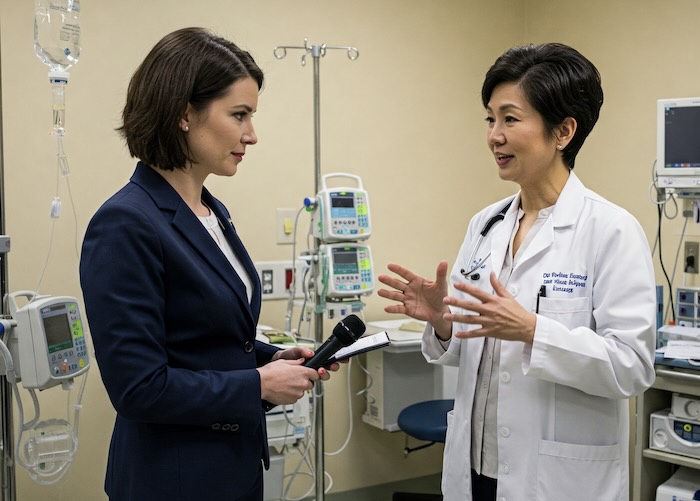 Some journalists decide to become specialists in specific areas, such as health, crime, the environment etc. These are known as ‘beats’ in some countries and ‘specialisms’ in others.
Some journalists decide to become specialists in specific areas, such as health, crime, the environment etc. These are known as ‘beats’ in some countries and ‘specialisms’ in others.
Specialisation allows a journalist to develop expertise and provide in-depth rather than superficial coverage.
Here we look at the concept of specialist reporting, its advantages and challenges, and how to succeed in this role.
What is a ‘beat’?
A beat is when a journalist focus on a specialised area of news coverage, such as health, education, or transport. In America the term ‘beat’ is often used. In other countries ‘specialism’ is preferred.
Today, specialist reporters are responsible for identifying and reporting newsworthy events within their assigned area, providing context and analysis to help their audience understand the issues being covered. Throughout this article we will use the term ‘specialist reporters’.
Benefits
Specialisms offers several advantages:
- News judgement: Specialist reporters develop a keen understanding of what constitutes news within their area. They can discern what is truly new, significant, and relevant, thanks to their continuous dealing with the topic.
- Source relationships: By building relationships with leading figures in their specialism, reporters gain access to valuable information and insights. They can also better assess the credibility and motivations of their sources.
- Contextual reporting: Specialist reporters can provide historical and contextual depth to their stories, helping their audience understand the significance of current events.
- Humanising news: Knowing the people behind the stories allows the specialist reporter to tell more humanised stories, and to better understand the impact of events on people.
Challenges
While specialist reporting offers numerous benefits, it also presents potential pitfalls:
- Objectivity: Close relationships with sources can compromise a reporter’s objectivity. It’s crucial to remember that the reporter’s primary responsibility is to the audience, not to their sources.
- Integrity: Sources may attempt to manipulate specialist reporters by withholding information or offering favours. Reporters must remain vigilant and prioritise their journalistic integrity.
- Stagnation: Familiarity can breed complacency. Specialist reporters must continually strive to see their specialism with fresh eyes, recognising the newsworthiness of events that may seem routine.
- Jargon: While expertise is valuable, specialist reporters must translate jargon into clear, accessible language for their audience.
Excelling as a specialist reporter
To succeed as a specialist reporter, consider these strategies:
- Preparation: Thoroughly research your specialism, including its history, leading players, and relevant laws and regulations.
- Contacts: Cultivate relationships with reliable sources in your specialism establishing clear expectations and maintaining open communication.
- News sense: Develop a strong news sense to identify newsworthy events and angles, even those overlooked by others.
- Simplicity: Translate specialised jargon into clear, concise language that your audience can understand.
- Relationships: Offer value to your sources by providing fair coverage and opportunities to share their perspectives.
- Boundaries: Always remember your duty to the audience, and do not become too close to your sources.
- Learning: Keep up to date with the latest developments in your field, and always be open to learning new things.
Covering a specialism
Specialist journalists delve deeply into a particular subject, becoming a go-to source for nuanced understanding and authoritative reporting. This involves:
- In-depth research: Moving beyond surface-level information to understand the history, context, key players, terminology, and underlying issues of a chosen field.
- Networking and source development: Cultivating a robust network of contacts, including experts, practitioners, policymakers, academics, and individuals directly affected by the specialist area. Building trust is paramount.
- Continuous learning: The specialist landscape is rarely static. Journalists must commit to ongoing learning, reading academic papers, attending conferences, following policy changes, and understanding emerging trends.
- Nuance and context: Specialist reporting avoids simplistic narratives. It highlights complexities, shades of grey, and the interconnectedness of issues, providing readers with a comprehensive understanding.
- Proactive story generation: Rather than simply reacting to news, specialist journalists proactively identify underserved stories, hidden angles, and potential impacts within their field.
- Ethical rigour: Maintaining the highest ethical standards is crucial, especially when dealing with sensitive or powerful subjects. This includes avoiding conflicts of interest, ensuring accuracy, and protecting sources.
- Understanding the audience: While deeply knowledgeable, a specialist journalist must also be able to translate complex information into accessible and engaging content for a broad audience.
Examples of specialist areas in journalism
The range of specialisms is vast and ever-expanding. Some common and emerging areas include:
- Politics: National, local, international affairs, parliamentary processes, elections.
- Economics/finance: Macroeconomics, specific industries (e.g., tech, energy), financial markets, consumer affairs.
- Law/justice: Court reporting, legal reforms, specific legal sectors (e.g., human rights, criminal justice).
- Health/science: Medicine, public health, environmental science, technology, scientific research breakthroughs.
- Environment: Climate change, conservation, environmental policy, renewable energy.
- Education: Educational policy, school systems, higher education, educational technology.
- Culture/arts: Specific art forms (e.g., theatre, film, music), cultural trends, heritage.
- Sport: Specific sports, sports business, athlete welfare.
- Technology: Artificial intelligence, cybersecurity, software development, social media.
- Social affairs: Poverty, inequality, migration, social justice, community development.
- Conflict & security: Geopolitics, defence, terrorism, humanitarian crises.
- Investigative journalism: While a methodology, it often becomes a de facto specialism for those focusing on exposing wrongdoing across various sectors.
Summary
Specialist reporting is a valuable asset to a newsroom because it allows journalists to provide in-depth, informed coverage. By mastering the skills and strategies outlined above, reporters can excel in their chosen area and serve their audience effectively.








